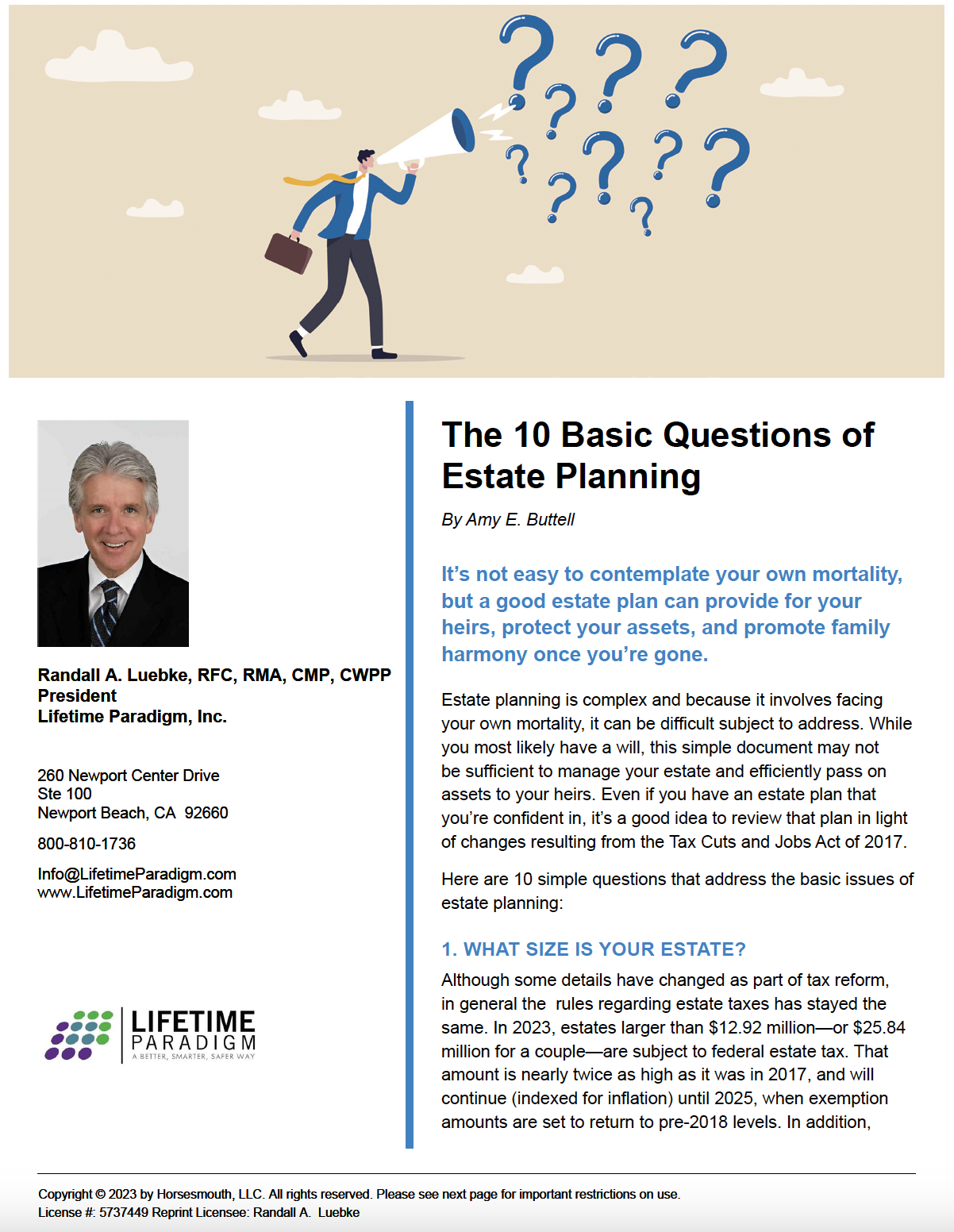Estate Planning
The 10 Basic Questions of Estate Planning
It’s not easy to contemplate your own mortality, but a good estate plan can provide for your heirs, protect your assets, and promote family harmony once you’re gone.
Estate planning is complex and because it involves facing your own mortality, it can be difficult subject to address. While you most likely have a will, this simple document may not be sufficient to manage your estate and efficiently pass on assets to your heirs. Even if you have an estate plan that you’re confident in, it’s a good idea to review that plan in light of changes resulting from the Tax Cuts and Jobs Act of 2017.
Here are 10 simple questions that address the basic issues of estate planning:
1. WHAT SIZE IS YOUR ESTATE?
Although some details have changed as part of tax reform, in general the rules regarding estate taxes has stayed the same. In 2023, estates larger than $12.92 million—or $25.84 million for a couple—are subject to federal estate tax. That amount is nearly twice as high as it was in 2017, and will continue (indexed for inflation) until 2025, when exemption amounts are set to return to pre-2018 levels. In addition depending on where you live, state inheritance taxes may impact your estate or your heirs.
This means it’s more important than ever to establish a current valuation on the items in your estate so you’ll know whether your estate is likely to be subject to those taxes. Consult with an experienced financial professional and an estate planning attorney who may recommend legal and financial strategies that can serve to reduce or eliminate estate taxes, depending on your situation. Some of these options include charitable gifts (both during life and at death), annual gifts to family members, and different kinds of trusts.
2. WHAT ASSETS PASS OUTSIDE THE WILL OR PROBATE?
If you’re married and have assets that are owned jointly with the right of survivorship, those assets will pass directly to the surviving spouse and fall outside of the will. For many couples, this will include the family home, life insurance policies, and qualified retirement plans. This is good news for the surviving spouse, because those assets are not subject to any delays associated with probate.
Although many states have reduced the costs involved and simplified the probate process, it can be time consuming and difficult. Along with assessing how probate potentially affects your estate, it is a good idea to regularly review and update all your beneficiary designations to ensure that assets pass to the beneficiaries you desire. With divorces and changes in family structure, you don’t want any assets passing by accident to a former spouse, for example.
3. WHO SHOULD BE EXECUTOR?
The role of executor is a complex one that includes a wide variety of responsibilities. These include identifying the assets and managing them responsibly in terms of filing taxes and the final disposition of the estate.
Because the probate process can be time consuming and involved, it is important that the executor you choose has the time and energy to undertake these tasks. They should also have some familiarity with the financial issues involved. Although accountants and attorneys can assist with the task, any executor you appoint has the ultimate responsibility of managing the estate and seeing the task through from start to finish.
4. ARE THE INTENDED HEIRS MINORS OR DISABLED?
If your heirs include minor children or disabled children or adults, you will need to appoint a guardian. The decision surrounding who will raise a child or care for a disabled adult in your absence is one of the most important estate planning decisions you’ll make.
For some parents, a sibling or grandparent is the most appropriate choice. For others a close family friend may work best. For complex estates or in a situation where a significant amount of money will be distributed through the estate, it may make sense to name two guardians, one with the responsibility for disbursing the money and the other who will be responsible for caring for the child or children.
In the case of a mentally or physically disabled person, a special needs trust can protect the heir while providing funds to supplement government benefits.
Such trusts can be set up to ensure that the child will continue to be qualified for government benefits while providing for other needs that aren’t covered by Medicare, Medicaid, or Social Security disability. The trust can be funded in a variety of ways, potentially with money from parents or with the beneficiary’s own assets, perhaps from an accident settlement or lawsuit. Regardless of how the trust is funded, engaging an estate planning attorney with expertise in such vehicles is critical to protecting the needs of the child or adult.
5. WHO SHOULD BE A TRUSTEE?
If your estate involves one or more trusts, the appointment of a trustee or multiple trustees is a big decision. While executors have significant responsibilities, their tenure is limited. A trustee’s responsibilities can be more involved and last longer, perhaps even a lifetime.
Attorney Stephan R. Leimberg says, “The selection of a trustee is one of the most important decisions a grantor makes. A trustee who chooses poor advisors, is careless about tax issues, makes poor investment decisions, or is not sensitive to the needs of the trust beneficiaries” can lead to multiple problems, including infighting amid beneficiaries, tax problems, and potential investment losses.
When deciding who to appoint as a trustee, look for an individual or professional who is competent, has the ability to act in the best interests of the beneficiaries, has no conflicts of interest and who has the availability and interest in assuming this role. If your estate is complicated or large, it may make sense to appoint an institutional trustee along with an individual trustee. An institutional trustee can provide important expertise in tax and investment matters.
6. SHOULD YOU GIFT DURING YOUR LIFETIME?
Gifting is a powerful tool to reduce a taxable estate. Couples can give $34,000 in 2023— $17,000 per individual—to an unlimited number of people per year, avoiding the gift tax.
For many high net worth individuals, this is an opportunity to remove money from a taxable estate and help grandchildren, children, nieces, nephews, and other deserving individuals. In addition, when the gifts consist of appreciating property, significant sums can be removed from a potentially taxable estate.
Besides gifting to relatives, charitable gifts, both during life and in the form of bequests, can also reduce your taxable estate. In addition to gifts of cash, you may want to consider such special charitable vehicles as charitable gift annuities and charitable remainder trusts. Both combine a charitable gift with a lifetime stream of income to the donor.
7. ARE THERE UNIQUE CIRCUMSTANCES REQUIRING SPECIALIZED ADVICE?
There is no one-size-fits-all solution for estate planning and many situations need specialized expertise. For example, if you own a family business, there may be issues involving equalizing inheritance for children who are actively involved in the business versus those who are not.
Multiple marriages can also complicate estate planning by creating issues between a surviving spouse and children of an earlier marriage. In the case of a large estate, there can be infighting over any trusts in terms of whether assets should be invested to yield maximum income for the survivor or the largest possible remainder for the children. An experienced attorney can help you sort out these issues to reach a solution that is appropriate for you and your family.
8. HAVE YOU PLANNED FOR DISABILITY OR INCAPACITY?
No one likes to consider the potential for disability and/ or incapacity, but these situations can occur. To cover all the contingencies, it’s a good idea to consider a living trust and/or a durable power of attorney so your affairs can be managed if you or your spouse becomes incapacitated. In such a case, you can serve as the trustee of your own living trust, with backup trustees named to take over when if necessary.
Similarly, a durable power of attorney—it must be durable to remain in effect during incapacity—can be structured so that it only takes effect when two or more physicians attest to incapacity.
The alternative to having these documents in place is that your family would have to seek guardianship over you to take charge of your financial affairs, a potentially an unpleasant and emotionally draining task.
9. ARE ADVANCED DIRECTIVES IN PLACE?
Although end-of-life issues are not technically part of estate planning, they are a vital part of your overall plan. Consider drafting a living will that spells out specific measures to take in the event of a terminal illness or incapacity, along with a health care proxy designating someone to speak on your behalf if you can’t do so yourself.
Putting your wishes in writing can’t eliminate the anguish your family might face in making end-of-life decisions, but your instructions can go a long way toward reducing their emotional burden.
10. HAVE YOU DISCUSSED YOUR ESTATE PLAN WITH YOUR FAMILY?
According to a study by U.S. Trust, fewer than one- third of parents have shared their estate plans with their adult children. This lack of open communication can exacerbate conflicts within the family and result in expensive and protracted litigation, draining the estate of the very resources you want your family to enjoy in future years.
When communication is open, the potential for conflict is greatly reduced. Attorney Leimberg notes that of those families reporting no conflicts, more than 20% knew what to expect out of the estate and more than 80% believed that they were fairly treated.
A FINAL WORD
A knowledgeable attorney should be consulted to review an estate plan periodically or to formalize one if you don’t have one currently. It is recommended that estate plans be reviewed and updated every three years to take into account changing tax and estate laws and personal circumstances.
It’s also important to remember that despite the potential hassles and expense involved in creating a comprehensive estate plan, such a plan can ensure financial stability for your surviving spouse, preserve assets for your children and grandchildren, minimize potential taxes and other expenses, and ensure that your wishes are carried out.
Amy E. Buttell is a freelance journalist who has been published in the Journal of Financial Planning, the Financial Planning Association’s Practice Management Solutions Journal, and the New York Society of Security Analysts’ journal, “The Investment Professional.”

SERVICES WE OFFER RELATED TO THIS TOPIC
The information contained in this post is for general use and educational purposes only. However, we do offer specific services to our clients to help them implement the strategies mentioned above. For specific information and to determine if these services may be a good fit for you, please select any of the services listed below.
The 4x4 Financial Independence Plan ℠
The Smart Estate Plan Protector ℠
Retirement Planning
Asset Protection
Estate Planning
Tax Planning
Coaching and Consulting
EP 0012. The Three Generations of Annuities
The Financial Independence Now Podcast Hosted by Randy LuebkeIn Episode 12 of the Financial Independence Now podcast,...
11 Financial Tips to Make Caregiving Easier
Tax Planning Caregivers generally tend to their elderly/ disabled family members as a labor of love, but it can also...
EP 0011. Budgeting for Dummies
The Financial Independence Now Podcast Hosted by Randy LuebkeIn this episode of Financial Independence Now, host Randy...
Investment Advisory Services are offered through Lifetime Financial, Inc., a Registered Investment Advisory. Insurance and other financial products and services are offered through Lifetime Paradigm, Inc. or Lifetime Paradigm Insurance Services. Neither Lifetime Financial, Inc. nor Lifetime Paradigm, Inc., or its associates and subsidiaries provide any specific tax or legal advice. Only guidance is provided in these areas. For specific recommendations please consult with a qualified, licensed Advisor. Past performance is no guarantee of future results. Your results can and will vary. Investments are subject to risk, including market and interest rate fluctuations. Investors can and do lose money and, unless otherwise noted, they are not guaranteed. Information provided is for educational purposes only and is not intended for the sale or purchase of any specific securities product, service or investment strategy. BE SURE TO FIRST CONSULT WITH A QUALIFIED FINANCIAL ADVISER, TAX PROFESSIONAL, OR ATTORNEY BEFORE IMPLEMENTING ANY STRATEGY OR RECOMMENDATION DISCUSSED HEREIN.
This message is intended for the use of the individual or entity to which it is addressed and may contain information that is privileged, confidential and exempt from disclosure under applicable law. If you are not the intended recipient, any dissemination, distribution or copying of this communication is strictly prohibited. If you think you have received this communication in error, please notify us immediately by reply e-mail or by telephone (800) 810-1736 and delete the original message.
This notice is required by IRS Circular 230, which regulates written communications about federal tax matters between tax advisors and their clients. To the extent the preceding correspondence and/or any attachment is a written tax advice communication, it is not a full "covered opinion." Accordingly, this advice is not intended and cannot be used for the purpose of avoiding penalties that may be imposed by the IRS.





